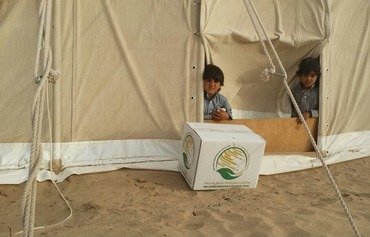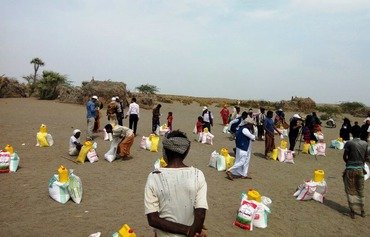As the Yemen war enters its fourth year today (March 26th), Yemenis fed up with the devastating conflict fuelled by the Iran-backed Houthis (Ansarallah) have been turning to social media to call on donor countries to fund economic development.
Earlier this month, Yemeni agency Small and Micro Enterprise Promotion Service (SMEPS) launched the "Bring development back to Yemen" social media campaign to highlight the importance of funneling aid towards reconstruction and investments that spur development.
Social media users in Yemen responded to the campaign by tweeting their support for turning the wheels of development again in their country using the hashtag #BringDevBack.
"Together towards development, creating job opportunities, construction, change...self sufficiency and a dignified life," a Yemeni humanitarian aid worker tweeted.
"Development is the lifeline for Yemenis; for those who are unemployed, for youth, children and students," another Yemeni tweeted.
Deteriorating conditions
The ongoing Iran-backed coup that enabled the Houthis to take over state institutions and take control of several Yemeni provinces, including the capital, Sanaa, is prolonging the war.
Living conditions in the war-torn country have gone from bad to worse, and development projects have come to a standstill.
The UN Security Council on March 15th warned that conditions in Yemen are worsening and having a "devastating" impact on civilians, with 22.2 million in need of humanitarian assistance, AFP reported.
The Yemeni Ministry of Planning and International Co-operation revealed that the gross domestic product (GDP) has lost 40.5% of economic activity since the outbreak of the war.
"The poverty rate has topped 85% in the absence of social and health services, compounding the suffering of citizens," Studies and Economic Media Centre president Mustafa Nasr told Al-Mashareq.
The suspension of public employees' salaries for the past 18 months has further placed millions of Yemenis at risk of famine, he said.
"The war has negatively affected economic development as all development projects have been suspended," economist Abdul Jalil Hassan told Al-Mashareq.
These include the project to export liquified natural gas from Balhaf in Shabwa province, he said, adding that another project to restore Marib's gas power plant was suspended in its second phase.
"Donor countries have stopped dispensing development funds that in the past covered projects in the health, education, public works and infrastructure sectors," he said.
The lack of foreign investment has led to a halt in local investment as well, Hassan added.
Development in the midst of war
"Yemenis are looking forward to the return of development and an end to the war," Nasr stressed.
The idea of launching the "Bring development back to Yemen" campaign emanated from several discussions among Yemeni youths about the importance of providing assistance to those affected by the war, said Fayza al-Suleimani, SMEPS public relations and media official.
The campaign calls for "practical" solutions that will help Yemenis live a decent life, she told Al-Mashareq.
The maturity of young Yemenis "was a major reason for the success of the campaign", she said, noting that youth from all provinces rallied behind it.
The hashtag resonated with thousands of people, she added, noting that "the youth were able to make their voice heard and convey to the world that Yemen will overcome the humanitarian disaster if [its people] are given the right tools".
SMEPS, which has strongly supported the youth in their campaign, "has demonstrated with unequivocal evidence, that sponsoring development projects in the midst of conflict is possible", al-Suleimani said.
The Social Fund for Development (SFD), of which SMEPS is a unit, "is also a key leader in this field and has actively participated in the campaign by presenting models of community initiatives throughout Yemen", she said.
More than 5,000 initiatives have contributed to solving problems related to basic services, infrastructure and unemployment amid the continuing war, she added.
What Yemenis need today is not temporary assistance, but rather real opportunities, al-Suleimani said.
The hashtag #BringDevBack has been successful, she said. Its message "reached all local and international organisations, and fortunately it resonated with many".
"The real challenge, however, comes after the campaign; the hashtag was only the starting whistle blow," she said.

![Marginalised children paint on a wall during a campaign called 'Open Day of Art' in support of peace in Yemen on March 15th. [Mohammed Huwais/AFP]](/cnmi_am/images/2018/03/26/11997-Yemen-Sanaa-children-600_384.jpg)






